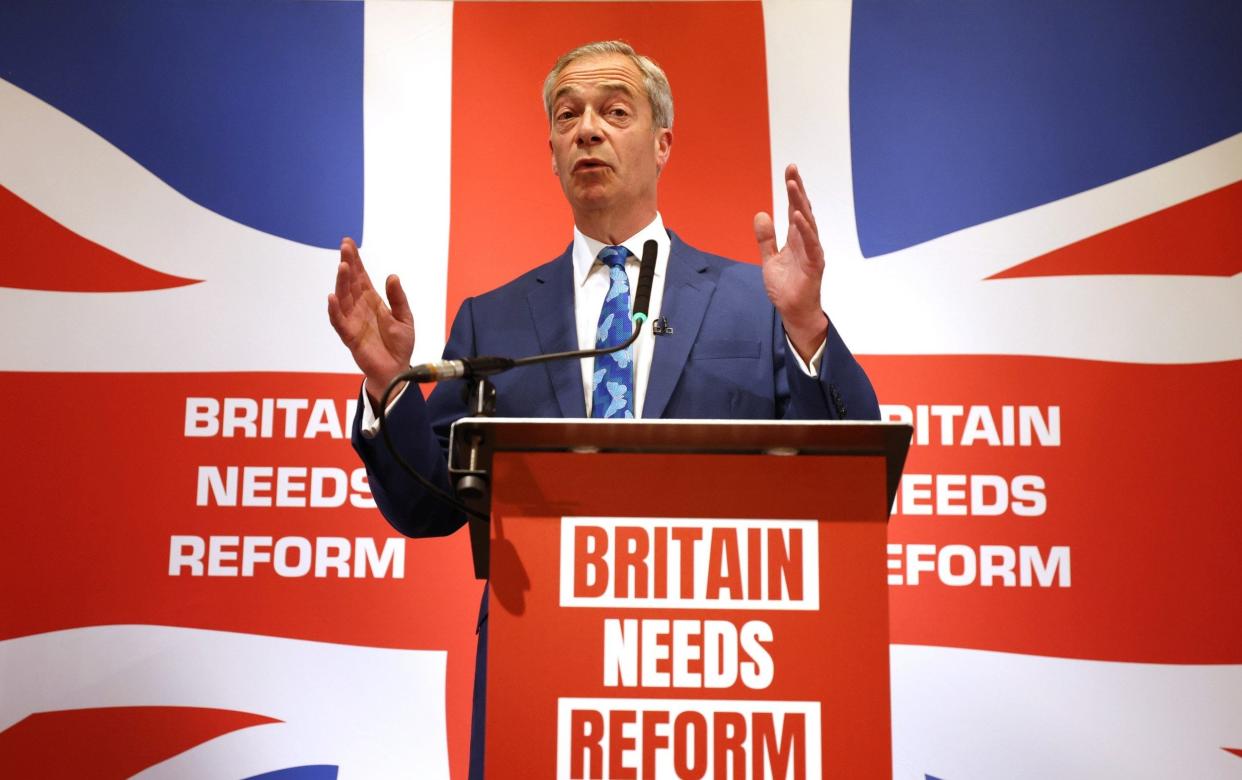Nigel Farage can win in Clacton and save Britain from this funk. I should know

I’m thrilled Nigel Farage is standing in my old seat, Clacton. My former constituents, who I represented in Parliament for 12 years, deserve a proper choice on July 4. What they have had on offer until now was a choice between two Tweedledee and Tweedledum parties.
Will Nigel win? A good rule of thumb that I used to gauge the level of support for Ukip, the predecessor of Reform UK, is that the party would poll roughly twice in the Essex constituency what it polled nationwide. With Reform UK currently on 15-18 per cent in the polls across the country, Nigel could be within striking distance in Clacton, but victory is by no means certain.
Nigel needs to go local to win. A general election is 650 individual constituency battles, and it is essential to focus on the specifics of the area. In Clacton, that means doing more than talking about immigration or Europe. Nigel needs to be talking about local GP surgeries, too.
A candidate needs to show an authentic interest in the community, or you risk leaving locals feeling that you merely want their vote to get into the House of Commons. As the local MP, I spent more time talking about my mulberry jam-making recipe than I did about iniquities of the European Union. (I might not have won the jam-making contest, but I won the constituency every time).
Nigel would do well to begin with a series of low-key “Get to know Nigel” meetings. He needs to talk to people on their doorsteps, not blast them from loudspeakers on a bus.
In the run-up to the EU referendum, I did everything to ensure that the Brexit campaign was run by the Vote Leave team that Matthew Elliot and Daniel Hannan had assembled. Our only chance of winning, I realised, lay in a campaign with the self-awareness to see things the way undecided voters viewed them. Nigel will only win if he does something similar in Essex over the next few weeks.
Rather than criticise Nigel for dithering about the decision to stand, we should see it as a sign that – once again – he has had to get involved because those who ought to present a clear conservative platform have failed to.
Nigel in Clacton will bring back a strong sense of deja-vu. Almost exactly a decade ago, I changed parties and resigned as an MP to give my constituents the chance to approve my decision to switch. In doing so, I risked everything on a party that had never previously won a parliamentary seat.
Clacton gave me its approval, returning me with one of the largest swings in British election history. I held onto the seat comfortably in the general election that followed.
Thanks to Clacton, the Conservative Party establishment was forced to concede the referendum, which helped decisively tilt Britain towards Brexit.
Are we about to see a similar seminal moment?
Clacton played a central role in securing our exit from the EU. The constituency may yet save the country from the funk into which Britain has now sunk.
Since the Brexit vote, the Conservative Party has managed to make a mess of almost everything. First, it bungled the terms of our EU departure, with the ludicrous Theresa May negotiating terms that still leave the UK hamstrung.
Then came Covid, when the Conservatives behaved like socialists, allowing people like Matt Hancock to implement disastrous lockdowns, effectively bankrupting the country in the process. On everything from net zero to mass immigration, the Conservatives have made the wrong calls.
After 14 years of Conservative administration, the Left is more firmly entrenched in our public institutions than ever before.
Perhaps the Tory party’s biggest achievement was to ensure that, even when the electorate votes conservative, they end up with a Left-wing administration.
By voting in Nigel, Clacton will not change the likelihood of a Keir Starmer landslide. But it might just help conservative Britain make the changes we need in order to one day present an alternative.
I ran in Clacton because I wanted a fundamental change in British politics. Sadly, that has not happened. The Conservative Party as it currently exists is not up to the task of making it happen, either.
The Conservative Party’s biggest problem is not policies, but personnel. For almost two decades now, it has gone big on diversity hiring, parachuting in third-raters to safe seats because they tick various inclusion boxes.
If you run an institution on the basis of something besides competence, you soon become institutionally incompetent. Look at the mediocrities serving as ministers and the composition of the Cabinet to see what years of A-list candidate selection have accomplished.
It is impossible to imagine that the Conservative Party today would be in this mess had it allowed properly democratic candidate selections over the past decade. Had it permitted individuals with principle and character to stand as candidates, I doubt they would have allowed the party to make all those policy blunders, either. Karma, as they don’t say in Clacton.
Douglas Carswell is the President & CEO of the Mississippi Center for Public Policy

